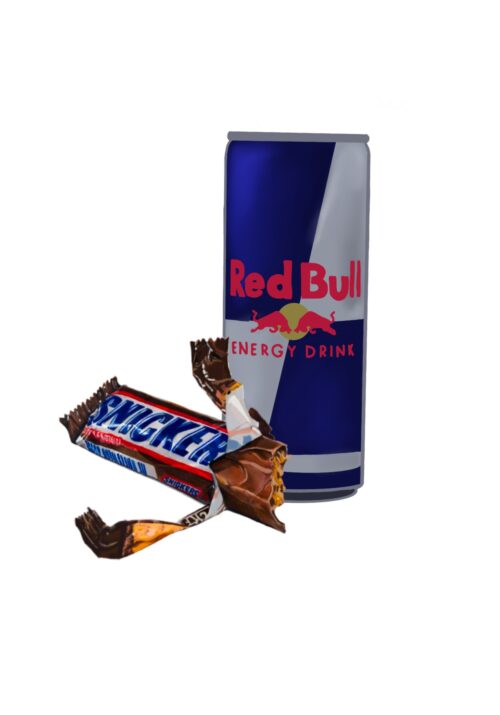Harvard students likely do not reach for a Snickers in times of stress, opting instead for a tried-and-true cup of joe. But should they? Small amounts of chocolate and sugar are proven to reduce perceived stress levels by reducing the production of the hormone glucocorticoid. Small doses of sugar present a viable alternative to consuming caffeine, but not one that Harvard students presently consider.
When asked to compare students’ attitudes toward caffeine at her high school and here at Harvard, Gabi Poniz ’26 said, “more people at Harvard drink energy drinks,” as opposed to the lattes and less caffeinated drinks many at her high school drank. Harvard students are utilitarian coffee consumers: they prioritize caffeine content and efficiency over taste.
I advocate for the replacement of Red Bull with a mini Snickers bar. Whereas caffeine accelerates heart rate and often leads to increased productivity, it also increases stress and anxiety. At high doses, caffeine may do more harm than good when it comes to Harvard students’ mental well-being and stress levels.
Poniz herself drinks one to two Celsius energy drinks a day. “Psychologically, it makes me think that I have a substance in my body that can keep me awake. I get a little more energized in terms of a placebo, but it’s not effective at reducing stress.” Similarly, Zuzanna Kowalski ‘26 said: “I’m under the impression that if I get coffee, I’m going to be productive.” But she went on to say “I do end up getting pretty anxious when I drink a lot” of caffeine. The Placebo effect seems enticing enough to drive Harvard students to drink more caffeine, despite the clear adverse effects on stress and anxiety levels.
Caffeine seems physically effective for keeping students awake and productive, but at the cost of stress and sometimes even their mental well-being. Though most Harvard students appear to rely on caffeine to keep them awake, not all do. When asked about her caffeine intake, Hayden McJunkin ‘26 said “I drink absolutely nothing,” though she seems to be the exception instead of the rule. She is one of the only students she knows who does not drink caffeine.
Sugar—a suitable alternative— grants students an extra burst of productivity without negative cardiovascular effects and increased stress levels. Chocolate contains low doses of caffeine, but supplements the caffeine with sugar, which boosts brain function temporarily and can also increase productivity. Chocolate has also been found to reduce perceived stress levels in medical students. Small doses of sugar could be the answer to curbing the consumption of other energy drinks that contain unknown ingredients and chemicals. But Harvard students seem skeptical about the merits of sugar as a caffeine alternative.
Students’ lack of interest in candy as an alternative is much more apparent during the month of October, as Halloween approaches quickly. There is little embrace among the student body of using Halloween as an excuse to buy and eat more candy. “People here are wary about what they eat..they have this preconceived notion that sugar is bad,” said Poniz.
.
A renewed embrace of sugar as a means of boosting energy and productivity in the short term could mean less stressed Harvard students. As Halloween rolls around this year, it could also mean more spirit around campus regarding the holiday. Candy often connects students and children to the Halloween spirit. It offers us back the nostalgia of trick-or-treating as kids and the strong childhood memories associated with it.
“I personally think that HUDS should also have a trick or treat bowl at the end,” proposed Poniz. I would agree. A new embrace of the Halloween spirit through candy among the Harvard student body could also mean the discovery of a new, less stress-inducing way to study: one that replaces a case of Red Bull with a bag of Kit Kats.
Sachi Laumas ’26 (slaumas@college.harvard.edu) plowed through a bag of mini Snickers to write this article.

